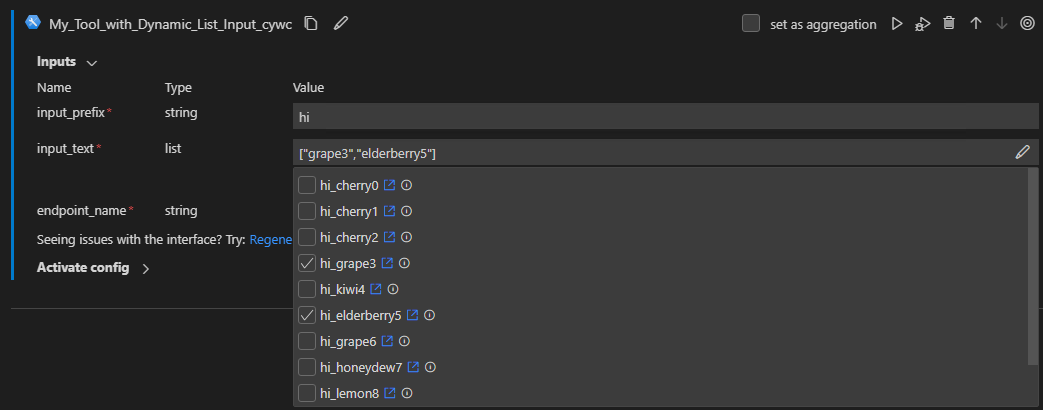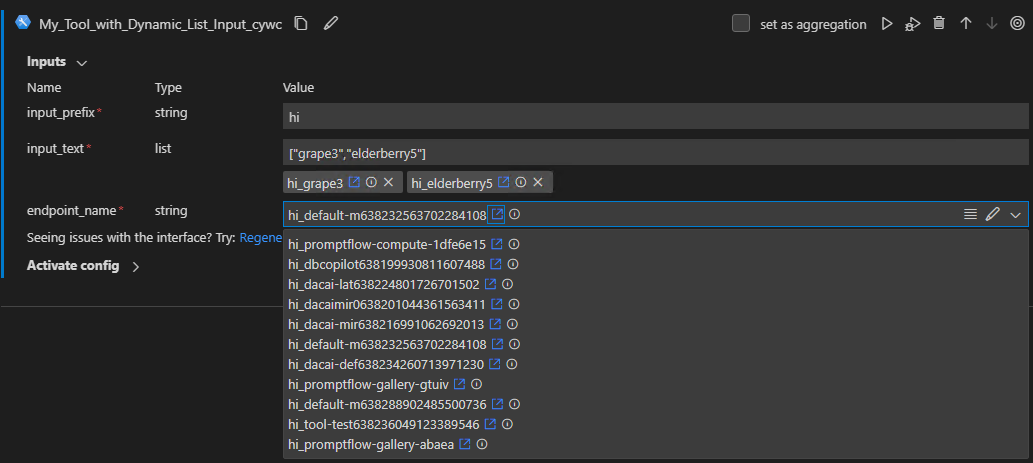创建动态列表工具输入#
工具输入选项可以使用动态列表即时生成。工具作者不是拥有预定义的静态选项,而是定义一个请求函数,该函数查询后端(如 API)以检索实时选项。这使得能够灵活地与各种数据源集成,以填充动态选项。例如,该函数可以调用存储 API 来列出当前文件。用户在运行工具时会看到最新的选项,而不是硬编码的列表。
先决条件#
请确保您已安装最新版本的 用于 VS Code 的 Prompt flow (v1.3.1+)。
请安装 promptflow 包并确保其版本为 1.0.0 或更高版本。
pip install promptflow>=1.0.0
创建具有动态列表的工具输入#
创建列表函数#
为了启用动态列表,工具作者定义了一个具有以下结构的请求函数
类型:常规 Python 函数,可以位于工具文件或单独的文件中
输入:接受获取选项所需的参数
输出:返回选项对象列表,格式为
List[Dict[str, Union[str, int, float, list, Dict]]]必需键
value:传递给工具函数的内部选项值
可选键
display_value:下拉列表中显示的文本(默认为value)hyperlink:单击选项时打开的 URLdescription:鼠标悬停时的工具提示文本
此函数可以进行后端调用以检索最新选项,并以标准化的字典结构将其返回给动态列表。必需和可选键支持配置每个选项在工具输入下拉菜单中的显示方式和行为。请参阅 my_list_func 作为示例。
def my_list_func(prefix: str = "", size: int = 10, **kwargs) -> List[Dict[str, Union[str, int, float, list, Dict]]]:
"""This is a dummy function to generate a list of items.
:param prefix: prefix to add to each item.
:param size: number of items to generate.
:param kwargs: other parameters.
:return: a list of items. Each item is a dict with the following keys:
- value: for backend use. Required.
- display_value: for UI display. Optional.
- hyperlink: external link. Optional.
- description: information icon tip. Optional.
"""
import random
words = ["apple", "banana", "cherry", "date", "elderberry", "fig", "grape", "honeydew", "kiwi", "lemon"]
result = []
for i in range(size):
random_word = f"{random.choice(words)}{i}"
cur_item = {
"value": random_word,
"display_value": f"{prefix}_{random_word}",
"hyperlink": f'https://www.bing.com/search?q={random_word}',
"description": f"this is {i} item",
}
result.append(cur_item)
return result
使用列表函数配置工具输入#
在工具 YAML 的 inputs 部分,将以下属性添加到要动态化的输入中
dynamic_list:func_path:列表函数的路径 (module_name.function_name)。func_kwargs:要传递给函数的参数,可以引用其他输入值。
allow_manual_entry:允许用户手动输入值。默认为 false。is_multi_select:允许用户选择多个值。默认为 false。
请参阅 tool_with_dynamic_list_input.yaml 作为示例。
my_tool_package.tools.tool_with_dynamic_list_input.my_tool:
function: my_tool
inputs:
input_text:
type:
- list
dynamic_list:
func_path: my_tool_package.tools.tool_with_dynamic_list_input.my_list_func
func_kwargs:
- name: prefix # argument name to be passed to the function
type:
- string
# if optional is not specified, default to false.
# this is for UX pre-validaton. If optional is false, but no input. UX can throw error in advanced.
optional: true
reference: ${inputs.input_prefix} # dynamic reference to another input parameter
- name: size # another argument name to be passed to the function
type:
- int
optional: true
default: 10
# enum and dynamic list may need below setting.
# allow user to enter input value manually, default false.
allow_manual_entry: true
# allow user to select multiple values, default false.
is_multi_select: true
# used to filter
input_prefix:
type:
- string
module: my_tool_package.tools.tool_with_dynamic_list_input
name: My Tool with Dynamic List Input
description: This is my tool with dynamic list input
type: python
在 VS Code 中使用工具#
打包并共享工具后,您可以根据工具包指南在 VS Code 中使用它。您可以尝试使用 my-tools-package 进行快速测试。
pip install my-tools-package>=0.0.8


注意:如果您的动态列表函数调用 Azure API,您需要登录 Azure 并设置默认工作区。否则,工具输入将为空,您无法选择任何内容。有关更多详细信息,请参阅 常见问题。
常见问题#
我是一名工具用户,无法在动态列表工具输入中看到任何选项。我该怎么办?#
如果您无法在动态列表工具输入中看到任何选项,您可能会在输入字段下方看到以下错误消息
“由于 XXX 无法检索结果。请联系工具作者/支持团队以获取故障排除帮助。”
如果发生这种情况,请遵循以下故障排除步骤
记下显示的精确错误消息。这提供了有关动态列表未能填充的原因的详细信息。
检查工具文档中是否有任何先决条件或特殊说明。例如,如果动态列表函数需要 Azure 凭据,请确保您已安装 Azure 依赖项,已登录并设置了默认工作区。
pip install azure-ai-ml
az login az account set --subscription <subscription_id> az configure --defaults group=<resource_group_name> workspace=<workspace_name>
联系工具作者/支持团队并报告问题。提供错误消息,以便他们可以调查根本原因。
